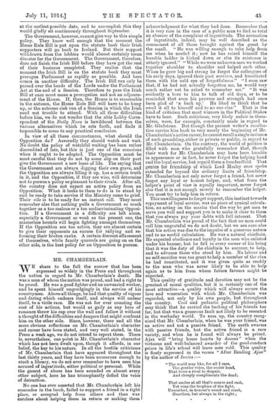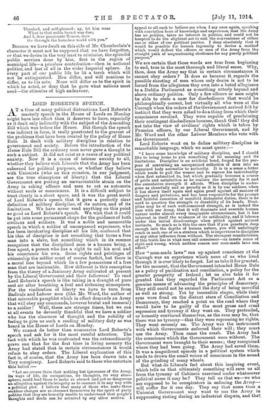MR. CHAMBERLAIN.
WE share to the full the sorrow that has been expressed so widely in the Press and throughout the nation in regard to Mr. Chamberlain's death. He was a man of whom the nation was proud, and had a right to be proud. He was a good fighter and an unwearied worker, and he spent himself ungrudgingly in the service of his countrymen. Above all things, he had that quality of vigour and daring which endears itself, and always will endear itself, to a virile race. He was not for ever counting the cost of his actions, but would as gaily as any hero of romance throw his cap over the wall and follow it without a thought of the difficulties and dangers that might confront him on the other side. Since, however, these and all the more obvious reflections on Mr. Chamberlain's character and career have been stated, and very well stated, in the Press a week ago, we do not intend to repeat them. There is, nevertheless, one point in Mr. Chamberlain's character which has not been dwelt upon, though it affords, in our belief, the key to his nature. In all the hostile criticisms of Mr. Chamberlain that have appeared throughout the last thirty years, and they have been numerous enough to stock a library, we do not ever remember to have seen him accused of ingratitude, either political or personal. While the gamut of abuse has been sounded on almost every other subject, here he has triumphantly defied the voice of detraction.
No one has ever asserted that Mr. Chamberlain left his comrades in the lurch, failed to support a friend in a tight place, or accepted help from others and then was careless about helping them in return or making them acknowledgment for what they had done. Remember that it is very rare in the case of a public man to find so total an absence of the complaint of ingratitude. The accusation of ingratitude, indeed, may be well described as the commonest of all those brought against the great by the small. " He was willing enough to take help from me when he needed it; now he has raised himself the humble ladder is kicked down or else its existence is utterly ignored." " While we were unknown men we worked together shoulder to shoulder and helped each other. When he grew big and strong he forgot the colleagues of his early days, ignored their past services, and humiliated them with the cold eye of forgetfulness." "I soon saw that, if he had not actually forgotten me, he would very much rather not be asked to remember me." " It was evidently a bore to him to talk of old days, or to be reminded that even his prowess and strength had once been glad of ' a back up.' He liked to think that he owed it all to himself and to no one else." That is the kind of criticism that most winners in the Political Stakes have to bear. Such criticisms, very likely unfair in them- selves, were, for example, constantly made in regard to Mr. Gladstone. But though the present writer's recollec- tion carries him back to very nearly the beginning of Mr. Chamberlain's active career, he cannot recall a single instance of such grumbling, either in private or public, in regard to Mr. Chamberlain. On the contrary, the world of politics is filled with men who gratefully remember that, though their work for Mr. Chamberlain may have been humble in appearance or in fact, he never forgot the helping band and the loyal service, but repaid them a hundredfold. That genius for friendship of which Lord Morley once spoke extended far beyond the ordinary limits of friendship. Mr. Chamberlain not only never forgot a friend, but never forgot any loyal or honest helper, and, what from the helper's point of view is equally important, never forgot also that it is not enough merely to remember the helper. You must try to help him in return. This unwillingness to forget support, this instinct towards repayment of loyal service, was uo piece of cynical calcula- tion, no acting on the maxim that the way to get men to serve you well and support you is to make it clear to them that you always pay your debts with full interest. That Mr. Chamberlain was proud of the fact that no man could call him ungrateful we do not doubt, but we are sure also that his action was due to the impulse of a, generous nature and to no sordid calculation. He was a natural chieftain. He expected obedience and loyalty in the men who enlisted under his banner, but he felt in every corner of his being that it was the duty of the chieftain to succour, to help, and to advance those who stood by him. No labour and no self-sacrifice was too great to help a member of the clan he had constituted, and it was given quite as readily to the man who was never likely to be able to help again as to him from whom future favours might be expected. This quality of gratitude and devotion may not be the greatest of moral qualities, but it is certainly one of the most attractive—a quality which will always secure the love and veneration with which Mr. Chamberlain was regarded, not only by his own people, but throughout the country. Cool and pedantic political philosophers may think that he carried the backing of his friends too far, but that was a generous fault not likely to be resented. in the workaday world. To sum up, the country recog- nized that Mr. Chamberlain, when be was your friend, was an active and not a passive friend. The earth swarms with passive friends, but the active friend is a rare variety, and when he is found will always be prized. Ajax will "bring home hearts by dozens" when the virtuous and well-balanced awarder of the good-conduct prizes in life's school will leave men cold. This quality is finely expressed in the verses " After Reading Ajax" by the author of lonica :— "Tho world may like, for all I care, The gentler voice, the cooler head, That bows a rival to despair,
And cheaply compliments the dead; That smiles at all that's coarse and rash, Yet wins the trophies of the fight, Unscathed, in honour's wreck and crash, Heartless, but always in the right ; Thanked, and self-pleased : ay, let him wear What to that noble breast was due; And I, dear passionate Teucer, dare Go through the homeless world with you."
Because we have dwelt on this side of Mr. Chamberlain's character it must not be supposed that we have forgotten, or that we desire in the very least to minimize, the splendid public services done by him, first in the .region of municipal life—a priceless contribution—then in national politics, and last of all in the wider Imperial sphere. In every part of our public life he lit a torch which will not be extinguished. Men differ, and will continue to differ, as to his acts. None will differ as to the spirit in which he acted, or deny that he gave what nations most need—the stimulus of high endeavour.







































 Previous page
Previous page